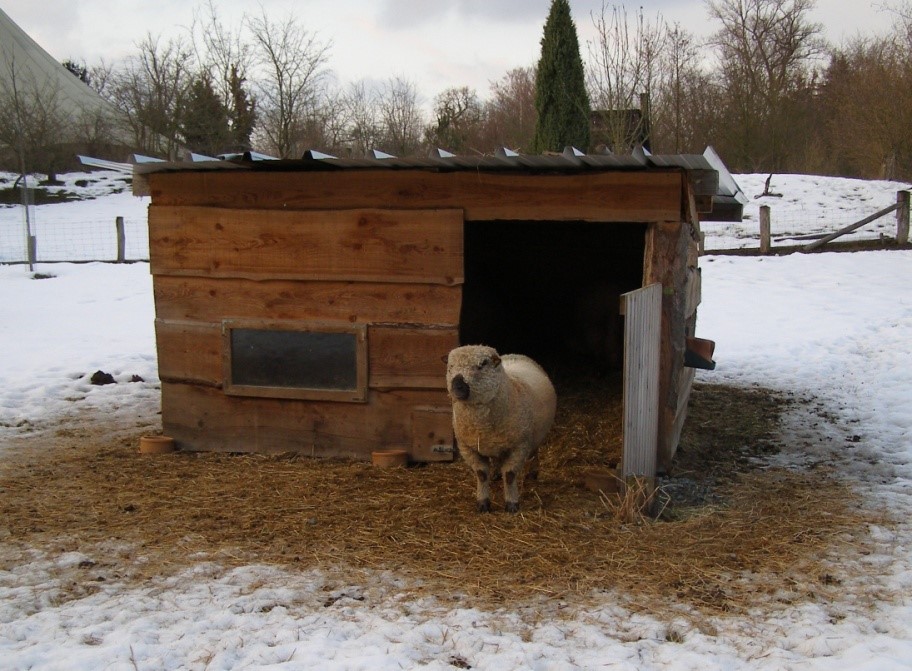Main Content

A Shropshire sheep standing in front of an example of proper winter shelter.
Are your sheep ready for winter? The most important thing you can do is to make sure they have enough wool for the cold months. If a sheep has enough wool, it will never be cold. Fortunately, sheep do not need a lot of wool to handle New Jersey winters. A couple of inches will be fine. Sheep shorn in August or September for fall shows should be able to grow back sufficient wool in time for bitter cold months.
Is your barn ready? Is the roof secure? The windows & doors should be able to close securely in case of bad wind and weather if you have newborn lambs. But there must be excellent ventilation. Have you recently cleaned out the manure? During the winter, the manure will build up and if the barn is closed securely without adequate ventilation, the ammonia smell will be detrimental to the health of the sheep, especially young lambs.
The number one cause of death in young lambs is hypothermia. I recommend using a heat lamp for the first day or two depending on how cold it is outside. Barns are not heated and can be very cold. As soon as the lambs are born, I put them under a heat lamp to keep them warm, and leave it on the first 24 hours. The next day it is off during the day and on at night. The third day I do not use it unless the lamb seems weak or needs more TLC.
Newborn lambs need to be kept in the barn for approximately three days. After that, unless there are issues such as a weak lamb or a “dumb” mother, we put the mother and lamb back into the flock with access to the outside and no heat lamp. By then they should be “hardened” to the cold weather unless there is a blizzard. By hardening, I mean getting used to the outdoor temperature. A good rule of thumb is if the barn is comfortable to you, then it’s too warm for the sheep.
Once the lambs are born, we give them access to the creep feeder. We keep a light on in the creep feeder, but it is more to encourage lambs to go in and eat than for heat.
What about hay? Do you have your hay for the winter? If not, do you know where you can get it and that it’s reserved for your sheep? Don’t forget to listen to the weather and if a storm is approaching, make sure you have plenty of feed for your sheep. Make sure you have access to water for them to all have clean water at all times. Nursing mothers need lots of water, but sheep that are not nursing need constant access to water, too. Don’t rely on snow for their water source. This can be a real challenge in freezing temperatures, so make sure you have a plan to prevent freezing hoses and water pipes!
Organize and clean everything so you know what you have and what you need to be ready for winter. Purchase what you need and get rid of empty feed bags, broken items and any other trash.
If your sheep are on pasture all winter, make sure your fences are secure. You should walk the fence line at regular intervals to guarantee they are safe and secure with no surprises waiting for you.
You never know when a terrible storm will hit. BE PREPARED! A good rule of thumb is to have 10% more on hand than you think you will need.
Susan Miller, Hunterdon County Volunteer